
OER Textbook for Child Psychology course
- Subject:
- Psychology
- Social Science
- Material Type:
- Full Course
- Textbook
- Author:
- Nicole Arduini-van Hoose
- Date Added:
- 06/07/2022


OER Textbook for Child Psychology course

Word Count: 79823
(Note: This resource's metadata has been created automatically by reformatting and/or combining the information that the author initially provided as part of a bulk import process.)
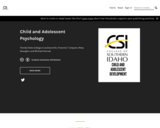
Word Count: 85398
(Note: This resource's metadata has been created automatically by reformatting and/or combining the information that the author initially provided as part of a bulk import process.)
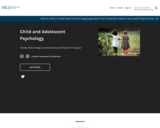
Word Count: 76759
(Note: This resource's metadata has been created automatically by reformatting and/or combining the information that the author initially provided as part of a bulk import process.)
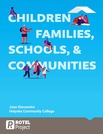
Children, Families, Schools, and Communities is an introductory text in the field of Child and Family Studies. It provides a lens for understanding the evolving definition of “family”. It promotes strategies for culturally sustaining and deeply collaborative relationships. Children, Families, Schools, and Communities is an adapted OER text from Rebecca Laff’s and Wendy Ruiz’s "Child, Family, and Community".

By the end of this section, you will be able to:Explain how classical conditioning occursSummarize the processes of acquisition, extinction, spontaneous recovery, generalization, and discrimination

This course is designed to provide an understanding of how the human brain works in health and disease, and is intended for both the Brain and Cognitive Sciences major and the non-Brain and Cognitive Sciences major. Knowledge of how the human brain works is important for all citizens, and the lessons to be learned have enormous implications for public policy makers and educators.
The course will cover the regional anatomy of the brain and provide an introduction to the cellular function of neurons, synapses and neurotransmitters. Commonly used drugs that alter brain function can be understood through a knowledge of neurotransmitters. Along similar lines, common diseases that illustrate normal brain function will be discussed. Experimental animal studies that reveal how the brain works will be reviewed.
Throughout the seminar we will discuss clinical cases from Dr. Byrne's experience that illustrate brain function; in addition, articles from the scientific literature will be discussed in each class.

This Open Educational Resource text has been created from a combination of original content and materials compiled and adapted from a number of open text publications.Attributions are more clearly delineated in the License and Attributions area of this textbook, including descriptions of which sections were edited prior to their inclusion.This Open Textbook is designed to be a comprehensive coverage of Psychopathology and Abnormal behavior in a clinical context, reflecting past and current research, including coverage of the DSM-5. Note from the author* : The variability of the in text citations and the absence of foot notes, reflect the very nature of this compilation of various source materials. We hope that this will not distract the reader. Original texts can be found by following the attribution url, for those interested in original authors, especially when a reference to research has been made.*Dr. Sonja Miller is a Clinical Psychologist and Visiting Assistant Professor at Suny Albany and Adjunct Professor of Psychology at Hudson Valley Community College (at the State University of New York at Albany).

How genetics can add to our understanding of cognition, language, emotion, personality, and behavior. Use of gene mapping to estimate risk factors for psychological disorders and variation in behavioral and personality traits. Mendelian genetics, genetic mapping techniques, and statistical analysis of large populations and their application to particular studies in behavioral genetics. Topics also include environmental influence on genetic programs, evolutionary genetics, and the larger scientific, social, ethical, and philosophical implications.
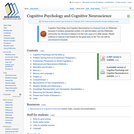
Cognitive Psychology is a psychological science which is interested in various mind and brain related subfields such as cognition, the mental processes that underlie behavior, reasoning and decision making.
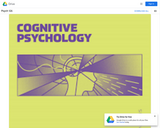
Explores the theory and research related to information processing, focusing on attention, perception, memory storage and information retrieval. Also highlights work in artificial intelligence and cognitive neuroscience which serves to describe and explain cognitive processes.
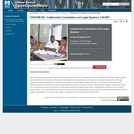
How do individuals and families interface with larger systems, and how do therapists intervene collaboratively? How do larger systems structure the lives of individuals and families? Relationally-trained practitioners are attempting to answer these questions through collaborative and interdisciplinary, team-focused projects in mental health, education, the law, and business, among other fields. Similarly, scholars and researchers are developing specific culturally responsive models: outreach family therapy, collaborative health care, multi-systemic school interventions, social-justice-oriented and spiritual approaches, organizational coaching, and consulting, among others. This course explores these developments and aims at developing a clinical and consulting knowledge that contributes to families, organizations, and communities within a collaborative and social-justice-oriented vision.
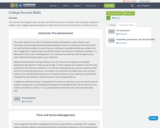
This resource aims to gather tools, exercises, and skills for instructors to utilize in order to prepare students for college success. College preparation programs in high schools are also recommended to use these resources.
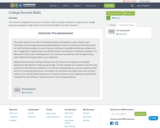
This resource is designed for instructors to utilize in order to prepare students for college success. College preparation programs in high schools are also recommended to use these resources.
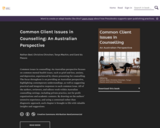
Short Description:
Common Client Issues in Counselling: An Australian Perspective focuses on common mental health issues, such as grief and loss, anxiety, and depression, experienced by clients presenting for counselling. The focus throughout is on providing an Australian perspective, highlighting contemporary understandings, as well as suggesting practical and integrative responses to each common issue. All of the authors, reviewers, and editors work within Australian counselling settings, including private practice, not for profit organisations and academic contexts. By drawing on the authors’ extensive experience, and using a contextual rather than diagnostic approach, each chapter is brought to life with valuable insights and suggestions.
Word Count: 109287
ISBN: 978-0-6456796-0-1
(Note: This resource's metadata has been created automatically by reformatting and/or combining the information that the author initially provided as part of a bulk import process.)
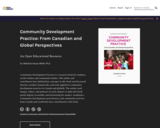
An Open Educational Resource
Short Description:
Community Development Practice is a resource book for students, social workers and community leaders. The author and contributors have defined key concepts in this book and discussed theories, models, frameworks, and tools applied in community development practice in Canada and globally. The author used images, videos, and podcasts in each chapter to make this book purely digital, accessible, and interesting for readers. Academics, Community Development practitioners, and community activists from Canada and worldwide have contributed to this book.
Word Count: 37263
(Note: This resource's metadata has been created automatically by reformatting and/or combining the information that the author initially provided as part of a bulk import process.)

Short Description:
Este cuaderno introduce a los profesores en conceptos clave de la Ciencia del Aprendizaje (es decir, la neurociencia cognitiva). El libro es el resultado de un proyecto europeo y su contenido se ha compilado a partir de talleres de desarrollo profesional continuo para profesores. El libro sirve principalmente para proporcionar una extensa lista de referencias para aquellos que buscan profundizar su conocimiento sobre la ciencia que subyace en cómo aprendemos.
Long Description:
Conceptos de la Ciencia del Aprendizaje para Docentes (proyecto Illuminated) introduce a los profesores en conceptos clave de la Ciencia del Aprendizaje (es decir, la neurociencia cognitiva). El libro es el resultado de un proyecto europeo y su contenido se ha compilado a partir de talleres de desarrollo profesional continuo para profesores. El libro sirve principalmente para proporcionar una extensa lista de referencias para aquellos que buscan profundizar su conocimiento sobre la ciencia que subyace en cómo aprendemos.
El ebook está disponible en inglés, español, finlandés, griego y portugués.
Please cite as: Beardsley, M. & Ruiz-Mejías, M. 2020. Conceptos de la Ciencia del Aprendizaje para Docentes (proyecto Illuminated)(1st ed.). Obtenido de https://illuminatedes.pressbooks.com/
Word Count: 20327
(Note: This resource's metadata has been created automatically by reformatting and/or combining the information that the author initially provided as part of a bulk import process.)

Perspectives for the Canadian Workplace
Short Description:
This book examines the nature of conflict in the workplace - its sources, costs and management, as well as workplace conflict management with respect to group interactions, organizational culture, and provincial/federal legislation. In addition, this book focuses on the individual; how our perceptions, emotions, motivation, personality and communication skills impact how we manage stress and conflict at work. Throughout the book, readers are encouraged to engage in critical self-assessment and case study review. These exercises provide the reader with the opportunity to assess potential conflict situations, recognize emotions, communicate assertively, and manage conflict with integrity and professionalism.
Long Description:
This Open Educational Resource (OER) is a custom publication for students enrolled in PSYC-6006: Conflict Management.
In the first half of the book, we will examine the nature of conflict in the workplace – its sources, costs and management. We will also briefly examine workplace conflict management with respect to group interactions, organizational culture, and provincial/federal legislation.
During the second half of the book, the focus will be on the individual; how our perceptions, emotions, motivation, personality and communication skills impact how we manage stress and conflict at work.
Throughout the book, you will be encouraged to engage in critical self-assessment and case studies. These exercises will provide you with the opportunity to assess potential conflict situations, recognize your emotions, communicate assertively, and manage conflict with integrity and professionalism.
Word Count: 168804
(Note: This resource's metadata has been created automatically by reformatting and/or combining the information that the author initially provided as part of a bulk import process.)
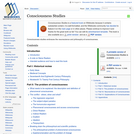
Everyone has their own view of the nature of consciousness based on their education and background. The intention of this book is to expand this view by providing an insight into the various ideas and beliefs on the subject as well as a review of current work in neuroscience. The neuroscientist should find the philosophical discussion interesting because this provides first-person insights into the nature of consciousness and also provides some subtle arguments about why consciousness is not a simple problem. The student of philosophy will find a useful introduction to the subject and information about neuroscience and physics that is difficult to acquire elsewhere.

Training for Preventing and Responding to Sexual Violence in B.C. Post-Secondary Institutions
Short Description:
A workshop and facilitation guide to support B.C. post-secondary institutions to prevent and respond to sexual violence and misconduct. Consent & Sexual Violence is a 90-minute workshop for all members of the campus community: students, faculty, administrators, and staff. This training explores different understandings of consent, including the legal definition. Learners have the opportunity to develop skills related to asking for and giving consent in all relationships as well as discuss strategies for creating a “culture of consent” in campus communities. (The slide deck that accompanies this resource can be downloaded from the Introduction.)
Long Description:
A workshop and facilitation guide to support B.C. post-secondary institutions to prevent and respond to sexual violence and misconduct. Consent & Sexual Violence is a 90 minute workshop for all members of the campus community: students, faculty, administrators, and staff. This training explores different understandings of consent, including the legal definition. Learners have the opportunity to develop skills related to asking for and giving consent in all relationships as well as discuss strategies for creating a “culture of consent” in campus communities. (The slide deck that accompanies this resource can be downloaded from the Introduction).
Word Count: 24282
ISBN: 978-1-77420-102-2
(Note: This resource's metadata has been created automatically by reformatting and/or combining the information that the author initially provided as part of a bulk import process.)